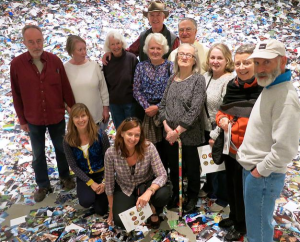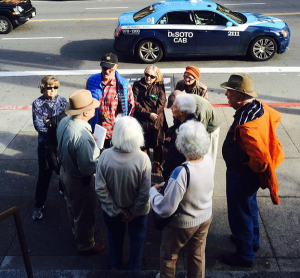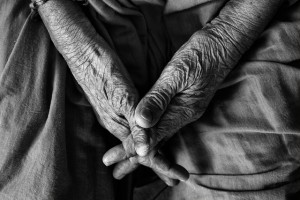Today we speak with Patricia Ris, the program director of Memory Care Cafe. Her San Francisco-based program teaches people with Alzheimer’s how to stay involved in their communities and maintain an active lifestyle. The group focuses on people in the early stages of the disease, with special attention given to caregivers of those who have Alzheimer’s. Read part one of her interview here.
Marissa: What unique issues do people in the early stages of Alzheimer’s face, compared to those in later stages of the disease?
Patricia: I think it may be part of getting older; I’m getting older myself. I see that there is a certain retreat in some way from society. The frequency of becoming engaged in groups becomes less and less. I think that with people with Alzheimer’s it happens at a more rapid speed because it’s harder to interact with people.
If someone develops aphasia, it’s harder to talk and to have a conversation. Of course there are all kinds of ways in which Alzheimer’s can express itself. Also, people become embarrassed for forgetting things. We all forget things from time to time, and we all know the feeling of deep embarrassment when we tell a story for a second time or realize we forgot an important detail. So that happens very frequently. Because of that, people seem to retreat into their own space.
I think also that the secondary wave that accompanies that feeling of inadequacy is the pressure from the issue itself, because it is something very frequently that cannot be resolved. As opposed to when we’re younger, we tend to do exercises. We know how to re-assess ourselves when we’re younger. But for the social isolation, the other aspect is that senior centers do not provide services to this specific type of population. There is not really a place to go, aside of course from the adult day centers, which only welcome people who are a little bit farther down the road. And then there is another problem: people who are in the early stages are very reluctant to mingle with people who are in the middle stages. Everyone can imagine why that is.
Marissa: Right, that interaction wouldn’t necessarily be on the same level. So what are the differences between caring for someone in the early stages and caring for someone who’s further along in the disease?
Patricia: Well, the job becomes harder and harder. There’s as many varieties of Alzheimer’s as there are individuals in the world. Every case is different. Initially, for instance, the physical wellness is still intact, so people are able to walk and to engage, and take care of their personal hygiene. As the illness progresses physically and mentally, I have seen patients where aphasia becomes nearly complete. The communication that exists between one of the clients and me is I affirm her desire to speak and I affirm the story I think she wants to tell so she can agree with me. But the percentage of the clear communication that she is able to produce is reduced to 15 percent. And there you see very small bits of information and not a long response. I can see how she wants to develop longer thoughts, so I help her through if it’s OK. I understand that she wants to develop a long thought, and I affirm that with her, but I’m never really aware of what that longer thought is.
Marissa: That must be frustrating.
Patricia: Of course when somebody becomes in-confident, there’s a whole different aspect of life that opens up, and it becomes difficult. We do have people who are in different stages, and we have people who progress very quickly, and we have people who progress very slowly. It’s hard to project one kind of progression on each individual because of all of the differences. We have people who have been with us for two years, who have progressed rather quickly into the next phase of the disease, but because they are familiar with us, and because they are comfortable in the group, they keep coming, as long as their care partner can continue to bring them. Frequently the difficulties arise in the morning, like their personal hygiene and getting dressed, have become an obstacle to get them out the door. Several of our caregivers say, “Once we’re there, it’s great. Getting my spouse out of the door is so difficult, sometimes I just don’t engage in that anymore.”
Marissa: That’s something people don’t often think about when they take on the job. Do you have any other tips for caregivers on how to care for their loved ones?
Patricia: The first tip is to seek out a support group. That’s one of the most important things to do, to find peers and an organization that supports you, usually the Alzheimer’s Association. Get resources, find information. But I think it’s also really important to continue socialization, and to push for changes in society that help you stay part of society with your loved one with forgetfulness. I think part of this organization is not just providing someone with quality of life for care partners, but to educate the environment in which we function. One thing that I think is really important is that some of our care partners who are more outspoken are coming out with Alzheimer’s, and they’re not afraid to tell people they have Alzheimer’s. I’ve seen people who have had this illness, who have it in such a way that they forget that they have it. One of the people I worked with was told continuously that they had Alzheimer’s, and that shock came over and over and over.
Marissa: That had to be tough to hear on repeat.
Patricia: That was a really bad way to go. We can’t really say, “This is the way to go for everybody.” Every individual has to be viewed very carefully in how they want to live with their diagnosis. We have an unbelievably assertive couple with us who are advocates on TV and are involved with the Alzheimer’s Association. The woman who has Alzheimer’s has a very slow progressing case of Alzheimer’s. She is able to be very vocal and very funny because she’s not as affected by the disease. There are others who were scientists, and who were lawyers, who are devastated by the disease, and I don’t know if they would be so willing to come out with it. They get really depressed about what’s happening to them.
Marissa: When you work in a career that’s entirely based on memory, I can see how this diagnosis would be especially upsetting.
Patricia: Yep. I think now there are really interesting resources available. Deborah and I went to the Buck Institute for Aging Research a couple of weeks ago to go to a lecture about cooking for the healthy brain. There are things you can do to counteract the effects of Alzheimer’s, and the scientists of the Buck Institute claim that it is possible to turn the clock back on early stage Alzheimer’s with nutrition, diet and exercise. That’s why we’re doing what we’re doing with the exercise part, because it’s really important. Depression is usually a consequence of any kind of disease, and especially cognitive disease, and exercise is also really good against depression. They sound like open doors for people who are health-minded, but for a lot of people who don’t think that way, I think that’s the way to go. Stay active, stay connected, get information and reverse your trends. I think a lot of this has to do with aging in general. A lot of things that people with Alzheimer’s focus on come out of ageist perspectives of society, and their own projection of how they’re going to age.
Marissa: Right, if someone has a picture of how they want to age, they don’t usually plan for an Alzheimer’s diagnosis. You never know what’s down the road.
Patricia: Exactly, yes.
Tips for Handling a Loved One’s Forgetfulness
1. Offer your loved ones comfort and don’t take their anger personally
2. Speak in calm, clear, short sentences
3. Make eye contact and use body language
4. Don’t correct the person or ask about the recent past
5. Have frequent conversations
6. Explain your actions and be encouraging
7. Be flexible and ask for help if you need it
Marissa: Do you have a favorite moment from your time at Memory Care Cafe? A favorite place you visit with your clients?
Patricia: There’s a picture of us walking through the redwood forest at Golden Gate Park at the arboretum. I’m the happiest when I see this trail of seniors walking through the redwoods and enjoying nature. I think a lot of the stress and the regrets and the pain falls away when they’re in nature. I think the beach is wonderful too, but it’s harder for some people to walk on sand. This is one of the consequences of Alzheimer’s too, with clarity for your motor movements that can fall away. We usually have to find flat trails and even surfaces for them to walk on. That picture in the arboretum in the redwoods is just so liberating, for them and for me.
Marissa: Thank you for speaking with us!
Patricia: Thank you.
Read Part One of this interview here!

 How Do Caregivers Enjoy Time with Alzheimer’s Patients? An Interview with Patricia Ris, Part Two
How Do Caregivers Enjoy Time with Alzheimer’s Patients? An Interview with Patricia Ris, Part Two






 John Mulaney’s “Funeral Planning” on Netflix: No Real Plan
John Mulaney’s “Funeral Planning” on Netflix: No Real Plan

 Composting Bodies Is Now Legal in a Dozen States
Composting Bodies Is Now Legal in a Dozen States














